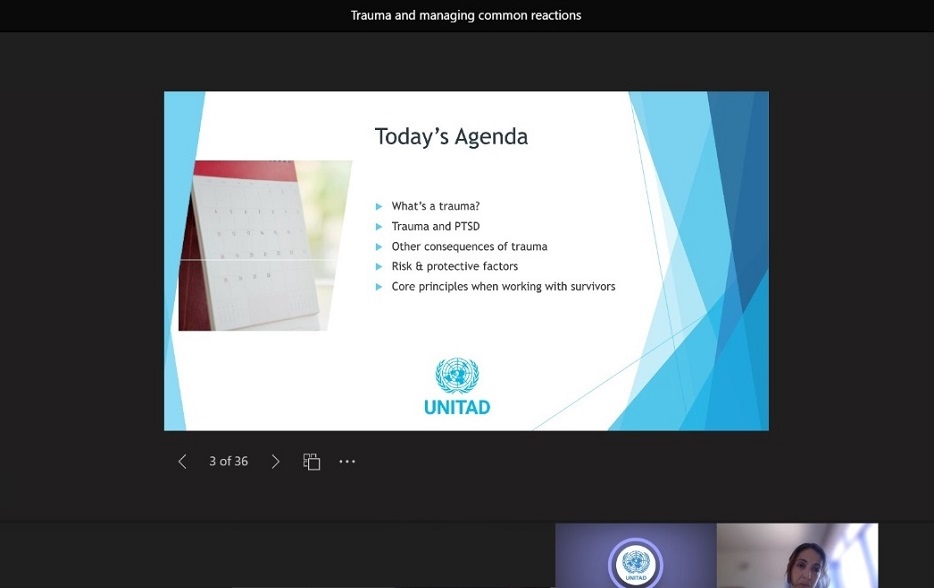Psychosocial Support Training for CIGE Material
UNITAD WPSU psychology team initiates a training series for the Commission for Investigation and Gathering Evidence (CIGE)’s legal and psychosocial support teams. The series responds to the needs of the Commission and the communities it works with. It introduces a number of training modules that support the work of CIGE while working with survivor and victim communities on investigations and gathering evidence.
Trauma and Managing Common Reactions – 9th June
The purpose of this training is to familiarize CIGE staff with the physical and psychological reactions of individuals who have experienced trauma, so they feel more competent in recognizing and addressing such issues.
Training components will cover:
- What is trauma and PTSD?
- Understanding the neurobiological effects of trauma on speech, memory and behavior
- Understanding and identifying common trauma reactions and symptoms
- Tips on how to work sensitively with survivors of severe traumatic events
Stabilization Techniques in Investigative Interview – 10th June
Recollection of traumatic events can trigger acute emotional reactions in survivors, such as dissociation. In their different forms and levels of intensity, dissociative symptoms can be quite overwhelming for the affected person and may at times leave service providers unprepared in knowing how to respond. Having a better understanding of what dissociation is and how it affects the mind and body can help psychosocial workers and legal staff identify the main symptoms and respond appropriately. The acquisition of grounding and relaxation techniques can equip staff with tools to effectively handle critical situations and better support beneficiaries in distress. The training provides CIGE Legal and Psychosocial staff with some knowledge of the main characteristics of dissociation and the tools and resources to best handle such reactions in practice.
Training components will cover:
- Dissociation: definition, main features and warning signs
- General rules when handling dissociative symptoms
- Practical grounding and relaxation techniques
How to conduct vulnerability assessment with children – 16th June
Using a combination of approaches and assessment methods, psychologists and psychosocial workers attempt to understand not only a child’s overall level of functioning, but also any meaningful patterns of strengths and weaknesses that may help with plans for psychological interventions and support.
This module explores how the needs of children should be addressed throughout to mitigate any impact of the legal process, and help them give their best evidence. It describes best practices to conduct a comprehensive child focused psychological assessment.
Training components cover:
- Clinical presentations of children with prior trauma
- Components of a child focused psychological assessment
- Risk and protective factors for child emotional disorders
- Suggestions to avoid, minimize and address distress
- Methods to handle reluctance
- Special protective measures when dealing with children within the context of legal investigations
Parenting behavior in the context of child trauma – 17th June
In the context of Iraq adult and child victim/witnesses accessing CIGE for evidentiary purposes are likely to have a trauma history. In such situation’s parental trauma and that of the child may adversely impact the relationship. As such psychosocial interventions need to be designed in a way that normalizes the collective traumatic responses to ensure support to both parent and child. This training aims to provide psychosocial staff with guidance on how to support parenting practices in consultations with adult victim/witnesses and their children with a trauma history.
Training components cover:
- Defining trauma and PTSD – the effects of trauma on children and adolescents
- Recognizing behaviors – signs and symptoms of traumatic stress in children and adolescents
- Understanding how parental trauma impacts relations with the child
- Helping parents to understand their child or adolescent’s behavior when there is a history of trauma
- Comprehending how to support and promote positive parent-child interactions through a trauma informed lens
Trauma-Informed approach – 23rd June
CIGE’s role of documentation requires interviewing vulnerable individuals. If not appropriately handled, such process can potentially exacerbate trauma-related symptoms and cause re-traumatization. A trauma-informed approach enables to take steps to build rapport, minimize triggering the survivor’s trauma-related sensitivities, and use techniques that accommodate the impact of trauma on cognitive functioning. In doing so, it maximizes the likelihood of gathering complete and accurate responses. The training aims to provide CIGE’s staff with some practical strategies to improve their capacity to acquire valuable documentation while creating the best conditions for a safe and comfortable atmosphere for the survivors.
Training components cover:
- Core principles of a trauma-informed approach
- Key rules and messages
- Basic communication skills
- Questioning techniques
- Rapport building


